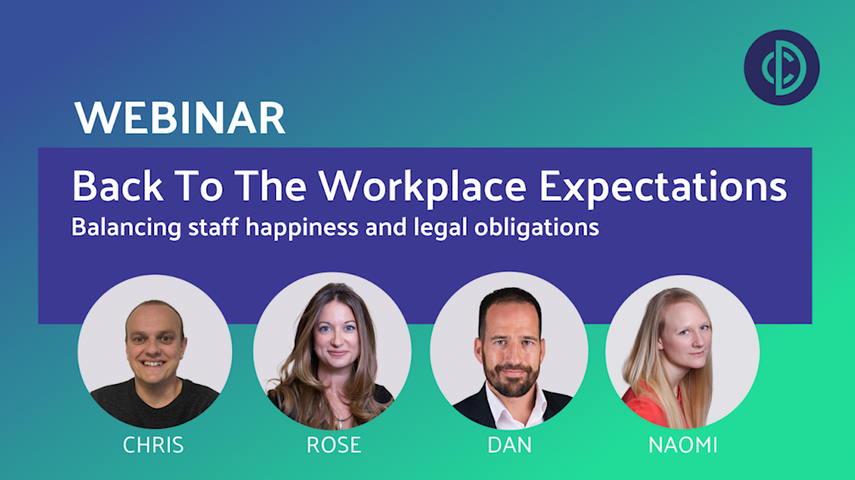Back to the Workplace Expectations

Balancing Staff Happiness and Legal Obligations
Recruitment Agency, Wade Macdonald has undertaken a review of employees’ expectations as they return to the workplace following the lockdown. Results show a major and seemingly irrevocable shift in the way working arrangements are viewed.
What will this mean for employers and to what extent will there be pressure to meet these expectations to ensure staff retention?
This panel event discusses achieving the right balance between legal obligations and keeping employees happy as we approach the (hopefully) final stages of the COVID-19 lockdown.
The session is chaired by Rose Smith (Senior Associate) with Chris Goulding (Managing Director, Wade Macdonald) looking at the outcome of the review. Dan Begbie-Clench (Partner) and Naomi Jameson (Legal Director) discuss the employment and health and safety law implications of the potential changes in working arrangements.
Questions covered include:
- What are employees expecting?
- Can employees who have been productive working from home during lockdown use this as a basis for insisting on working there permanently?
- What happens if employees want to go back to the office, but there is no longer an office space available for them?
- What new health and safety considerations should be had on returning to the office?
- How best to manage the concerns of employees who are nervous or anxious about returning or being around people?
Webinar Takeaways
The key points to take away from this webinar are:
- 95% of staff surveyed by Wade Macdonald say that they would like to work in a hybrid manner going forward although staff are working longer hours and reporting more mental health issues since the onset of the pandemic.
- Many businesses have already adopted or will be adopting a hybrid working approach in future, where possible. Candidates for employment are indicating they would have less interest in working for companies which are not doing so, which raises recruitment and retention concerns.
- Nevertheless, there is no right to work from home and a business can reject a request to do so whether part-time or full-time by showing that it would have a negative impact on the business. However, rejecting requests will be more difficult than before if the role was performed from home reasonably well during lockdown.
- For staff continuing to WFH, health and safety risk assessments should be carried out on their home working environment. Businesses should consider how staff can be supported with the associated potential increase in stress, lack of boundaries and isolation.
- Where staff are permitted to work from home, this should be conditional on their agreement to travel or attend the workplace as required by the business. Managers should consider methods and frequency of keeping in touch with home workers and should ensure expectations and targets are clear.
- Businesses should exercise particular caution and take appropriate steps to mitigate risk when considering closing any workplaces to replace them with home working arrangements and when dealing with flexible working requests from vulnerable staff.
- Employers should ensure any policies on testing, sickness absence and working from home are all up to date and fit for purpose, taking into account any Government guidance.
Interested in a particular area? Find the answer easily without watching the whole webinar (times are approx)
1. Minutes 0 - 1. Intro
2. Minutes 1 - 3:30. Wade Macdonald Report - The main findings
3. Minutes 3:30 - 4:30. Wade Macdonald Report - Were there any findings to be surprised about?
4. Minutes 4:30 - 12:45. Employer obligations when setting up and monitoring the health and safety, including in relation to mental health, of home working set up of employees
5. Minutes 12:45 - 14:00. Do we need to consider fire safety when working from home?
6. Minutes 14:00 - 18:40. Can employees who have been productive working from home during lockdown use this as a basis for insisting on WFH permanently?
7. Minutes 18:40 - 22:40. What happens if employees want to go back to the office, but there is no longer an office space available for them?
8. Minutes 22:40 - 24:40. What should businesses be thinking about in terms of disabled staff and flexible/hybrid working?
9. Minutes 24:40 - 29:00. What are the pitfalls of conflicting flexible working requests? Should there be equal treatment across different roles?
10. Minutes 29:00 - 33:20. Has the health & safely rulebook been rewritten because of COVID?
11. Minutes 33:20 - 39:00. Are we expecting to see new policies in place, on staying at home if sick, or requiring rapid flow testing, and can these be enforced against employees?
12. Minutes 39:00 - 42:00. What can/should be paid to support employees who are continuing to work from home full time?
13. Minutes 42:00 - 44:00. How do we manage the concerns of employees who are nervous or anxious about being in the workplace and/or being around people or using public transport?
14. Minutes 44:00 - 45:30. If we do have people working from home, can we still require them to come to meetings from time to time?
15. Minutes 45:30 - 47:20. What about those employees who might be looking to move overseas and perhaps work from a holiday home?
16. Minutes 47:20 - 49:00. Wade Macdonald, following employee expectations how do you think employers will react to these? Do we think there is a high appetite to give employees what they are looking for, for the sake of retention?
17. Minutes 49:00 - 50:00. Wade Macdonald, how might leaders in the business be convinced to agree to hybrid arrangements their staff would like, if they seem initially resistant to them?
18. Minutes 50:00 - 51:20. Wade Macdonald, are you seeing any particular themes as to what employers might be nervous to implement for their staff?
19. Minutes 51:20 - 54:56. Wade Macdonald, key takeaways from the report
Key Contacts
Dan Begbie-Clench
Dan specialises in employment law and advises a range of companies and senior executives, partners and employees. He is known for commercial and responsive advice. He is recommended for his work in the leading legal directories, the Chambers UK Guide and The Legal 500 Guide.
- Partner
- T: +44 (0)20 7778 7225
- Email me
Rose Smith
Rose is an employment and education lawyer. She has a track record in providing measured employment law advice, and is also part of Doyle Clayton’s renowned Education Team, providing advice to teachers, professors and schools.
- Legal Director
- T: +44 (0)20 7042 7206
- Email me
The articles published on this website, current at the date of publication, are for reference purposes only. They do not constitute legal advice and should not be relied upon as such. Specific legal advice about your own circumstances should always be sought separately before taking any action.


